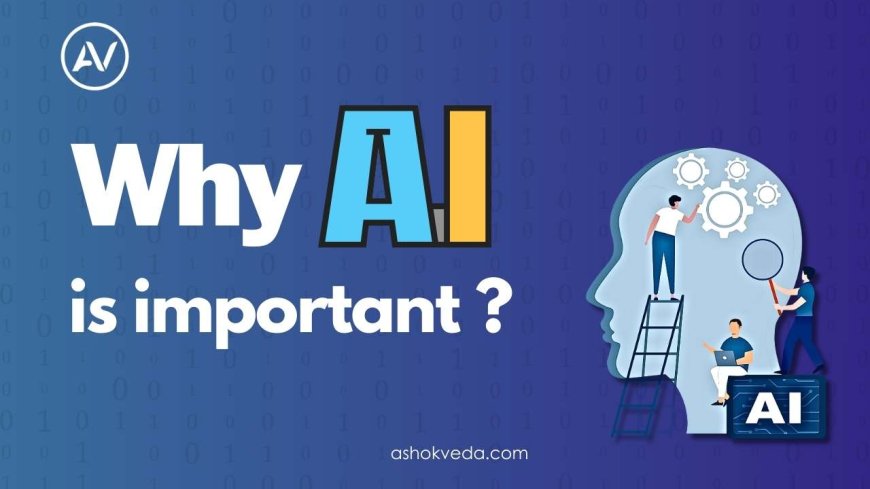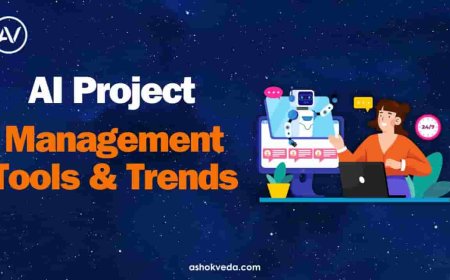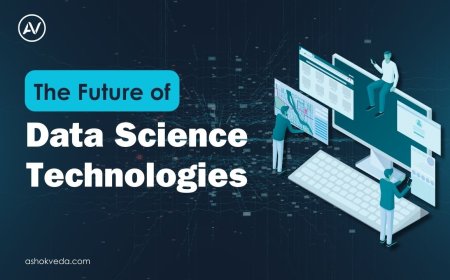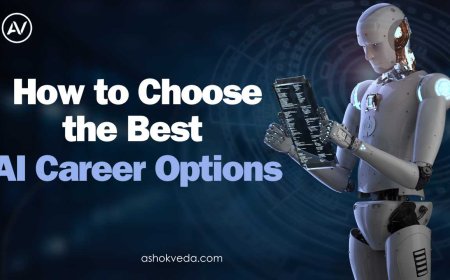Why AI is Essential for Modern Businesses
Learn why AI is crucial for modern businesses, improving efficiency, decision-making, and productivity while driving innovation and growth.

Making the most of AI's advantages and not just sticking to the newest technological trends is crucial for understanding the importance of AI in today's business world. Because of this, Why AI is Essential for Modern Businesses is more than a slogan; it's a necessary tool for succeeding in a market that is constantly evolving. AI tools help simplify difficult activities, enhance decision-making, and inspire creative solutions that promote efficiency and growth. By using AI in digital marketing, companies can predict market trends, customize client experiences, and adjust their tactics quickly. Interacting with an AI expert can help you fully understand the possibilities of automation and data analysis, making AI a key component of modern business plans. Businesses may achieve operational excellence and maintain a competitive edge in a world that is changing quickly by adopting the Why AI Matters approach.
Understanding Why AI in Business
Artificial intelligence, or AI, in business terms, refers to the use of computers to carry out tasks that usually call for human intelligence. This involves fast analysis of enormous amounts of data, task automation, and improved decision-making. Businesses may better identify trends and client needs by implementing AI, which helps speed up and improve the efficiency of business processes. In basic terms, artificial intelligence (AI) makes organizations smarter and more responsive to market shifts.
Types of AI
Have you ever questioned what types of AI there are? Learn about the interesting fields of natural language processing, machine learning, and other innovative technologies that enhance the intelligence of our devices!
Machine Learning: To make decisions or estimations, this type of AI learns from data. It's like teaching a computer to identify patterns through modeling.
Natural Language Processing (NLP): NLP is the process by which computers interpret and react to spoken or written human language. Voice-activated assistants and chatbots run on it.
Computer Vision: With the use of this AI technology, computers can recognize things in photos or videos and interpret and comprehend other visual data from their environment.
Robotics: Robotics is the application of artificial intelligence (AI) to physical robots so they can carry out activities involving movement or contact with objects that are real.
Expert Systems: Artificial intelligence (AI) systems that simulate human experts' decision-making processes. They have rules encoded into them that help them make judgments depending on particular inputs.
Speech Recognition: Speech recognition technology makes it possible for artificial intelligence (AI) to understand and analyze human speech, opening the door to voice-activated devices and apps.
Benefits of AI for Modern Businesses
Modern organizations are finding artificial intelligence (AI) to be a useful tool that helps them improve customer experiences, streamline operations, and make better decisions. Here are a few of the main advantages:
-
Efficiency: Routine processes can be automated by AI, which reduces errors and saves time. Employee attention can now be directed toward more strategic tasks requiring human intelligence.
-
Better consumer service: Chatbots and virtual assistants driven by AI can respond promptly and accurately to consumer requests around the clock. Higher levels of client pleasure and loyalty result from this.
-
Data analysis: AI can quickly sift over huge quantities of data to find patterns and insights that humans might overlook. This helps businesses make wise choices and maintain their competitiveness.
-
Personalization: AI can adapt product recommendations and marketing messages to specific users' preferences. Customers will feel appreciated and are more likely to do business with you again as a result.
-
Cost Savings: Artificial intelligence (AI) can help businesses cut operating costs by increasing efficiency and automating procedures. Resources for other crucial areas like growth and innovation may become available as a result.
-
Enhanced Innovation: By providing new thoughts and insights, artificial intelligence (AI) can support research and development. This may result in the development of fresh goods and services to satisfy shifting consumer needs.
Businesses looking to stay successful in the modern market should consider investing in artificial intelligence (AI) due to its many benefits.
AI Applications in Different Business Sectors
Artificial intelligence (AI) is having an important effect on a lot of different business sectors. It helps businesses be more efficient, provide better customer service, and make better decisions. Here are a few examples of AI's application across several industries:
Healthcare: AI assists with disease diagnosis, image analysis, and prognostication. Additionally, it helps with treatment plan customization and patient record management.
Retail: AI is used by retailers to optimize pricing, manage inventory, and make product recommendations. Chatbots powered by artificial intelligence improve customer service by offering real-time assistance and customized shopping experiences.
Finance: AI is used in finance to monitor risk, identify fraudulent transactions, and offer investment insights. AI systems also automate repetitive processes, which simplifies banking customer service.
Manufacturing: AI enhances production procedures via supply chain optimization, quality assurance, and predictive maintenance. Artificial intelligence (AI)-powered robots complete monotonous jobs with greater efficiency.
Marketing: AI uses consumer data analysis to build specialized advertising efforts. It supports better outcomes through ad spend optimization, social media interaction management, and content personalization.
Practical Applications
Netflix is a great example of how AI may help a business. Here's how AI is used by Netflix:
Personalized Recommendations: Netflix provides personalized movie and TV show recommendations based on your viewing preferences, what you've watched, and when you've watched it. This helps in your search for new and interesting products.
Content Creation: Netflix looks at user choices to determine what new shows and movies to make. They may guarantee that people will view their stuff by doing this.
Streaming Quality: Artificial intelligence adjusts the video resolution to match your internet speed, reducing delay and ensuring a smooth viewing experience.
Marketing: Netflix sends you specific messages and alerts about new content you might enjoy in order to keep you engaged and interested.
In conclusion, AI integration is essential for productivity, improved decision-making, and business growth. Netflix uses artificial intelligence (AI) to create specific suggestions and automate procedures, all while improving customer experiences and identifying trends. Businesses may meet customer expectations, maintain competitiveness, and achieve operational excellence in a dynamic market by embracing AI integration. Utilizing AI's full potential for long-term success is guaranteed for businesses by understanding why it matters.





































